Finding a blogging niche is not easy – there are so many things you need to consider.
In this article, I show you how to find a viable niche with enough traffic but not too much competition, and can be monetized.
- Going Too Broad
- Advantages of a Narrow Niche
- What Is a Blogging Niche?
- Getting Ideas For Your Niche
- How To Brainstorm a Niche
- How To Find a Blogging Niche
- Is the Commodity in Your Niche Online or Offline?
- Keyword Research for a Blogging Niche – Three Techniques
- Finding a Niche Within a Niche
- Conclusion
- More Articles About Blogging
Going Too Broad
The most common mistake beginning bloggers make is choosing a niche that is too broad.
Beginning bloggers almost always have an urge to go broad. The thinking is: the broader I go, the more traffic I’ll get (and the narrower I go, the less traffic I’ll get).
In fact, it’s the opposite!
The broader your niche, the longer it will take you to get search engine traffic to your website.
The reason?
Because it’s much easier to rank for a long tail keyword than it is for a ‘main’ or ‘head’ keyword.
Here’s an example:
It would take you years to rank for the keyword ‘seo’. In fact, it might not even be possible.
But ‘seo for real estate agents’?
My guess is you could rank for that quite quickly.
Here’s another example:
It would take forever to get on Page #1 of Google for ‘parenting tips’.
But what about ‘parenting tips for single dads’? You could rank for that keyword in half the time.
Picking a niche that’s too broad is one the reasons that beginning bloggers give up:
- they pick a topic that’s too broad
- they don’t get any traction with the search engines within their first year
- they get discouraged
- they give up
Advantages of a Narrow Niche
People are often afraid of going too narrow. But in my experience, blogs with a narrow niche do better than blogs with a broad focus.
Here are the main advantages of a narrow niche.
Its Easier To Become An Expert
With a narrow topic for your website, you can become an expert quicker.
For example, it’ll be much quicker to become an expert on ‘seo tips for real estate agents’ than it would be to become an expert on ‘seo’ in general.
After the Hummingbird algorithm, Google puts a lot of emphasis on how well a website covers a topic. It’s called topical authority.
You’ll be able to topical authority much faster for a website with a narrow focus, because:
- you have a smaller field – so there are fewer topics to cover
- there are fewer websites competing in that niche.
Visitors Will Understand Your Website Better
A narrowly-defined niche works better with humans as well.
A parent who lands on a website that specializes in ‘parenting tips’ won’t necessarily feel a strong bond with that website.
But a single father who lands on a website that deals only with parenting tips for single dads will immediately feel a bond with your content. He says to himself: “This is exactly what I was looking for”.
What Is a Blogging Niche?
Very simply, a blogging niche is a niche that appeals to a subset of a broader market.
Here are some examples:
- Pet Care > Bird Care > Budgerigar Care
- Exercises > Pilates > Pilates for People with Back Injuries
- Guitars > Electric Guitars > Cheap Electric Guitars
- Coffee > Filter Coffee > Organic Filter Coffee
- Baking > Cakes > Cake Decorating
- Gardening > Cold Climate Gardening
- Gardening > Container Gardening
- Travel > Frugal Travel
- Fitness > Fitness for Nerds
- Budgeting > Home Budgeting > Home Budgeting for Time Strapped Mums
Getting Ideas For Your Niche
To get ideas for your blogging niche try using an online niche research tool, such as Wordstream’s free Keyword Niche Finder.
It gives you 30 free searches, so that should be enough to get you going:

Type in your main or ‘head’ keyword and then just go through the long tail variations until you find a likely niche:
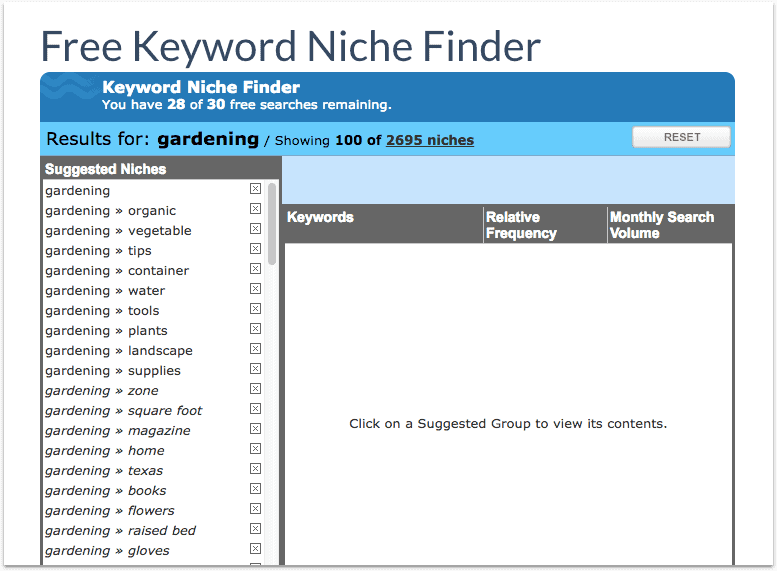
How To Brainstorm a Niche
Think back over the last 10 items that you purchased – chances are that’s where your passion lies and it’s also likely you’ve got a bit of expertise in that area.
For example, did you buy a high-end coffee machine? Or a sound mixer? Or a fish tank?
Those are all profitable blogging niches.
Or, simply look at the objects in your house: what do they tell you about your interests and hobbies?
Here’s another approach. Look at the books and magazines on your bookshelves: what do they tell you about your passions?
And if you’re thinking that your interest or passion could never translate into money, think again. People build profitable blogs from the most unlikely niches. Like the guy who started a website for buying and selling comics – in his first two years he had a turnover of $1 million!
How To Find a Blogging Niche
When choosing a blogging niche, there are two big factors you need to consider: profit and passion.
If you’re lucky, they will intersect. But sometimes you’ll have to chose one over the other.
Following Your Passion
It’s often said that you find your niche at the intersection of passion, knowledge and revenue potential.
But be wary of passion: just because you’re passionate about something doesn’t mean there’s a market for it. If you’re blogging for a living, you need to take a hard headed look at where the profits are.
On the other hand, you need to choose a niche that interests you. Blogging is hard work and it can take years before it becomes financially successful. If you have no real interest in the topic, it’ll be hard to keep going in those first years when you’re not seeing much return for your effort.
Also, if you’re not passionate about your niche, it will show through in your writing. How will you motivate people to read your content and sign up for your newsletter if you are not deeply motivated about your topic?
Following The Profit
One way to find out if your niche is profitable is to do some keyword research.
You’ll need paid a keyword research tool for this, one that includes CPC (cost per click) as one if its metrics.
Type in about 10 keywords associated with your niche. If those keywords have CPC of at least a few dollars, then there’s money to be made in that niche.
If you don’t have access to a keyword research tool, here are some other ways to find out if your proposed niche is profitable:
- Go to a newsagent and browse through the magazine stand. See if there’s a magazine dedicated to your niche – publishing is an expensive business and magazines only exist in niches where they can sell advertising.
- Type your niche keywords into Google and notice if there are any paid ads in the SERPs (Search Engine Results Pages). If there are, it’s a sure sign there are profits to be made in that niche.
- Go to Amazon and type in a few keywords associated with your proposed niche. Click on the products that come up and see if they have reviews. Every review represents up to 1000 actual customers.
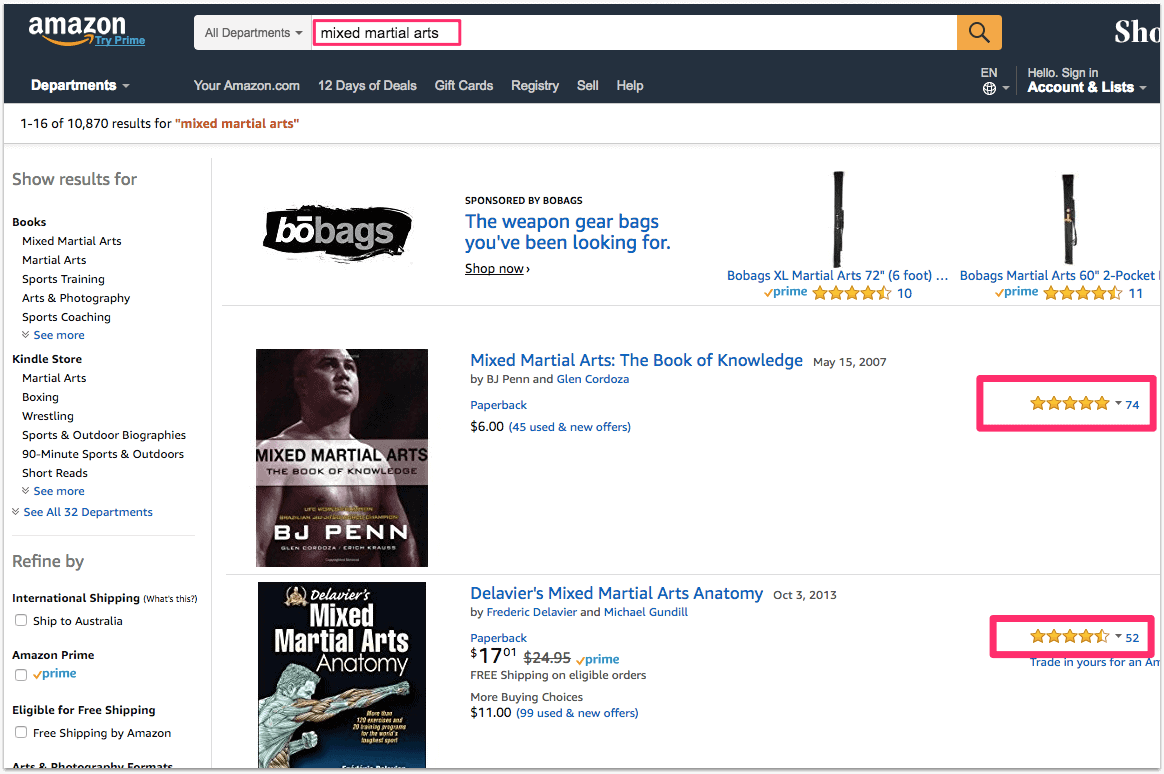
If your niche is in the digital sector, go to ClickBank Marketplace and click on the product category that most closely matches your niche.
Then sort the products by ‘Gravity’. This is a ClickBank algorithm that indicates how many affiliates are currently making sales of a given product. When you sort by gravity, you’ll be seeing the products that are earning the most affiliate commissions.

Another approach is to use Google to find out if there are affiliate programs within your proposed niche. Just type in ‘[name of your niche] affiliate programs’ and see what comes up.
Another way to assess whether your proposed niche is profitable is to look at other blogs in that niche and see if they are monetized (are there ads and affiliate links, is the website selling information products like courses and eBooks?)
If they are, that’s an indication that it’s a profitable niche.
Is the Commodity in Your Niche Online or Offline?
Here’s something to be aware of when choosing a niche. Some commodities are things that people will most likely buy in a local store.
For example, if your passion was interior decor, it would be hard to monetize your website by selling soft furnishings (cushions, pillows, wall hangings etc) because people will most likely just go down to their local department store and buy those things locally.
So always ask yourself: is this something that people will buy online? If not, you need to find another niche.
Keyword Research for a Blogging Niche – Three Techniques
When it comes to doing keyword research for a new blogging niche, there are three key aspects you need to research:
- Search volume
- Keyword competition
- Overall trends
You can check long-term trends for any given keyword using the free Google Trends.
Finding search volume and keyword competition will require a paid keyword research tool, such as Ahrefs, SEMrush, Spyfu, Keyword Tool Pro, or KWFinder.
Note: One advantage of Ahrefs over the other listed keyword research tools is that Ahrefs now offers a metric called ‘Clicks Per Search’. This is especially important in researching a blogging niche because not all searches result in clicks. Why? Because Google now presents ‘Knowledge Cards’ right at the top of the search results. When the information you were searching for is presented in a Google Knowledge Card, you don’t need to click through because the information is right there in front of you (try typing in ‘donald trump age’ and you’ll see what I mean). So a keyword may have very high search volume but very low CTR (click through rate). That’s where the new Ahrefs metric comes in handy!
The Google Keyword Planner, which was free, used to be the go-to tool for getting search volume and keyword competition figures.
But as of June 2016, it’s only available to people with a paid Ad Words account.
So how exactly do you go about researching search volume and competition is a given niche?
Technique #1 – Rand Fishkin’s Method
In the video below, Rand Fishkin of Moz outlines a detailed process for scoping out a new niche:
Rand’s method involves running Adwords campaigns that target keywords in your prospective niche and pointing the ads at various landing pages on your site.
This is the most thorough approach to keyword researching a new niche that I’ve seen. Once completed you’d have a very good idea of the potential of your prospective niche.
But it’s quite a complex process that could take a week or two to complete.
Technique #2 – Brian Clark’s Method
Here’s another approach to doing keyword research in a prospective niche: How to Choose a Profitable Niche
In this example, Brian Clark does keyword research for a potential blog on ‘Mixed Martial Arts’.
He finds that ‘mixed martial arts’ get 352 searches per day. This is a surprisingly low volume, given the media attention mma has received.
But then he digs a bit deeper, looking for semantically related keywords using Wordtrackers Keyword Tool. Now he finds that ‘mma’ and ‘MMA’ have a combined search volume that triples the search volume for ‘mixed martial arts’.
Digging still deeper, Brian finds that a related keyword, ‘UFC’ (stands for ‘Ultimate Fighting Championship’) has 9 variations which together add up to 7,098 searches per day!
This is a really useful case study that will show you how to go about finding variations of keywords within a niche.
More importantly, it shows you how to ‘read between the lines’ and use keyword research to understand searcher intent.
This is an important point: researching keywords in a niche is not only about the numbers – it’s also about understanding what people are looking for when they type in their search queries.
Technique #3 – My Method for Researching a Blogging Niche
My approach to keyword researching a new blogging niche is quite simple – I just take the same keyword research process I use for individual blog posts and expand it. After all, a blogging niche consists of multiple blog posts.
You’ll need a keyword research tool to do this. The one I use is the paid version of KWFinder:

However, KWFinder also has a free version that allows you 5 lookups per 24 hours and 50 Keyword suggestions per search.
So if you spread the research over a week you could get by with the free version.
Very simply, I use KWFinder to find long tail keywords with search volume between 50 and 500 and with keyword difficulty of 39 or less.
I start by typing in the keyword:
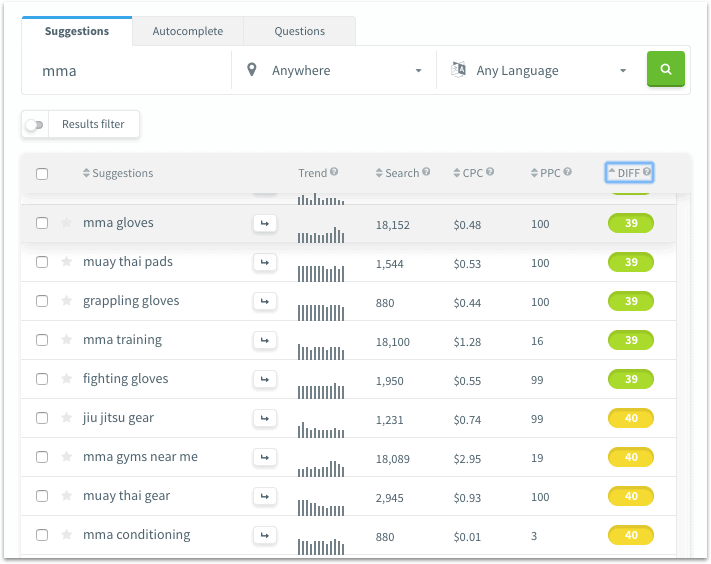
Then I apply a filter with the metrics specified above:
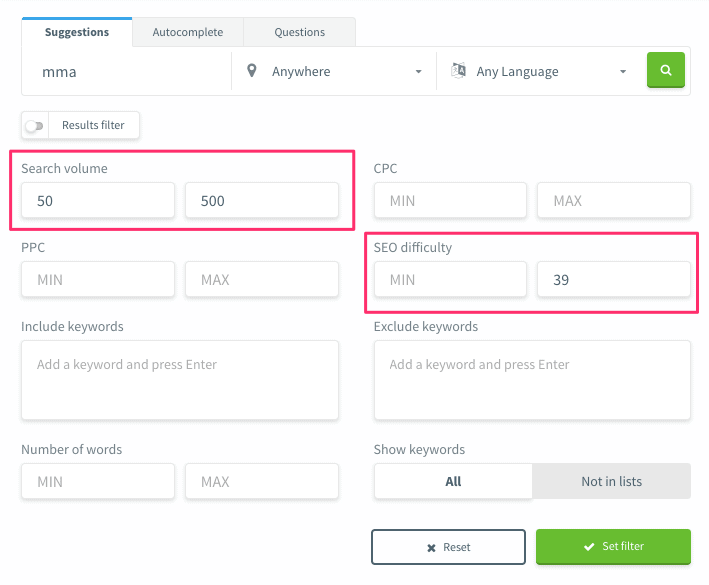
KWFinder then gives me all the keywords within that range:
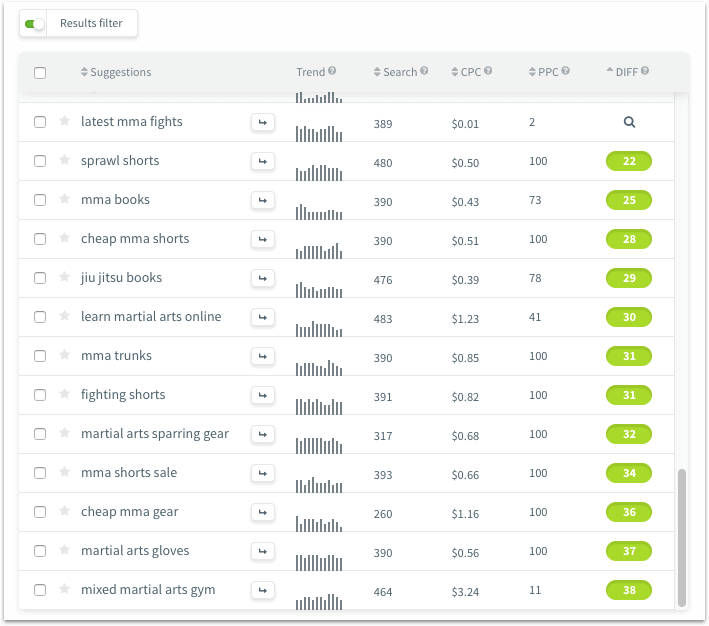
If you can find 20 to 30 long tail keywords that fit those parameters, you have a viable niche.
[My assumption here is that if I can find 20 to 30 viable keywords, there’ll be at least double or triple that number].
Finding a Niche Within a Niche
Whatever niche you choose, to succeed in that niche you’re going to have to differentiate your blog from the others. You’re going to need to carve out a territory, find a niche within the niche.
This is especially true in competitive niches.
And here’s something to remember:
No matter how competitive the niche, there will always be an angle that no one else has specialized in. There’ll always be a gap in the topic that no one is covering, an approach that no one has taken.
That’s your territory! That’s your niche within a niche.
You can do this in various ways:
- Personality Positioning – using your personality to connect with one particular section of the market
- Use personality amplifiers such as YouTube videos or podcasts
- Do one key thing better than any of the other blogs
- Bring a particular expertise to the niche
- Address a specific audience within the niche
- Solve a specific problem within your niche
- Create a blog with a different look and feel to the others in that niche
Brian Clark calls this process ‘intensifying’ your niche (‘How To Dominate Your Niche’).
He makes the point that you don’t necessarily need to compete directly with existing blogs in that niche. Instead, you can complement them by doing something that they’re not doing.
Conclusion
Finding the right niche for your blog will determine whether your blog succeeds or fails – it’s that critical.
Too broad and you’ll never find your target audience. Too narrow and you’ll struggle to get enough traffic.
With topical authority and topic modeling becoming increasingly important in search engine algorithms, finding a well-defined niche is more important than ever.
Most beginners make the mistake of going too broad. As a rule of thumb the more narrow your focus, the quicker you’ll find your target audience.
When choosing your niche, look carefully at search volume, keyword competition and overall trends.
Once you’ve found your niche, study the other blogs in that space and find a way to differentiate your blog. You can think of this as carving out a niche within a niche.
More Articles About Blogging
- 7 Powerful Blogging Tips To Help You Succeed In 2022
- 19 Experts Reveal Their Top Tips For First Year Bloggers
- 27 Experts Reveal Their Most Powerful Blog Promotion Technique
- The 7 Business Models of Highly Successful Webpreneurs
- How To Set Up Your Own Blog (From Start To Finish)
- Three Blogging Strategies To Help You Succeed In 2022
- Ryan Biddulph On Blogging For Fun and Finding Success
- Newsjacking – How To Get Traffic and Backlinks From Breaking News
- Does Your Blog Need A Niche in 2022?
- Best Blog Names – 19 Great Ways To Name Your Blog
- Blogging 101 – How To Start A Successful Blog in 2022
- How To Turn Articles Into Videos – 7 Tips You Need To Know
- Publishing on Medium – How To Add 13,000 Subscribers in 6 Weeks
- How To Succeed In Your First Year of Blogging
- 13 Surprising Facts About Blogging You Shouldn’t Ignore
Thanks for this article, I am found my niche for my new blog:) thank you
Hi Nehal, thanks for your comment. I’m glad the article was useful, Rob.
Hi Rob,
This article really gave me lots of information
thank you so much for sharing ! |
Helped me a lot !
Hi Darshan,
Thanks so much for your feedback. I’m glad the article was helpful.
All the best, Rob.
Hey Rob,
Thanks for creating such amazing content. It was really very helpful. would love to read more content on Adwords.
Regards,
Sucheta
Hi Sucheta, thanks for the feedback. I’ll see what I can do. Best, Rob.